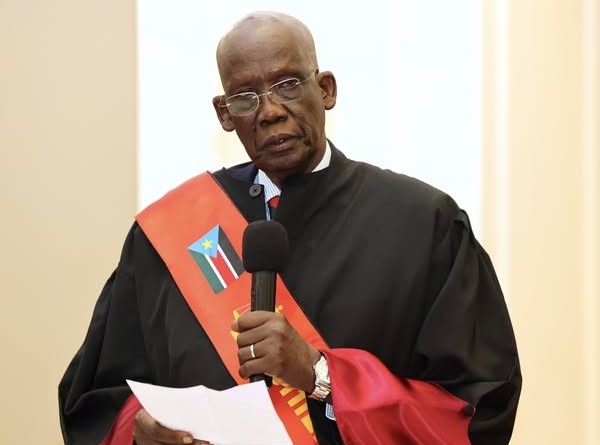
Civil society activist Edmund Yakani has urged South Sudan’s judiciary to prioritize accountability and independence, calling on newly appointed Chief Justice Dr. Benjamin Baak Deng and his deputy to spearhead meaningful reforms.
Yakani’s remarks come after President Salva Kiir emphasized the need for transparency and efficient justice delivery in a recent address during Dr. Baak’s inauguration.
Speaking to the media on Wednesday, Yakani underscored that judicial reform requires strong political will and financial backing from the executive and legislative branches.
“My first message to His Excellency, the President, and the leadership in the Council of Ministers is that these words will only be translated into action if the new judiciary leadership is politically and financially supported, and if their independence and neutrality are protected,” he stated.
While praising President Kiir’s call for reform, Yakani insisted that the judiciary must prove its impartiality.
“Public trust in our judiciary’s independence and neutrality has been very low. It is now your responsibility to demonstrate that you are independent, impartial, and free from political influence—only then will people have confidence in the system.”
Beyond the broader call for reform, Chief Justice Dr. Baak will face several challenges that have long plagued South Sudan’s judicial system. The judiciary has struggled with a judicial backlog, poor working conditions, inadequate allowances, and overcrowded prisons, issues largely stemming from a lack of judges to process cases.
Years ago, judicial staff raised concerns about poor working conditions under the previous administration. However, their complaints led to the suspension of judges, forcing many to either accept the status quo or face termination. Many judges chose the latter, leaving the country with a severe shortage of judicial officers.
The impact of this shortage has been felt in overcrowded prisons, where a high number of remand prisoners remain in detention due to the slow processing of their cases, judicial corruption, and a broad lack of independence of the organ.
Yakani warned that without urgent action, these challenges will continue to undermine the judiciary’s ability to deliver justice efficiently and fairly.
“The judiciary should not be shaped by politics, discrimination, or favoritism. The law governs politics, not the other way around,” he stressed.

